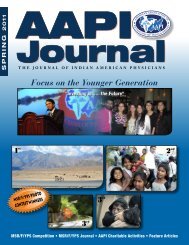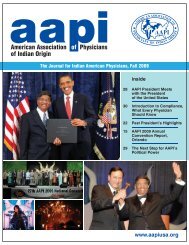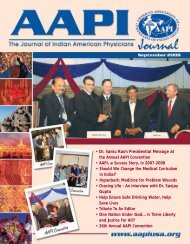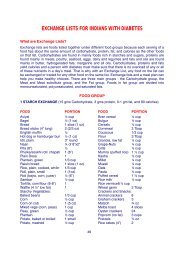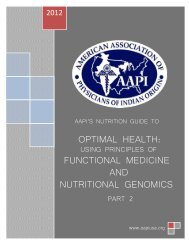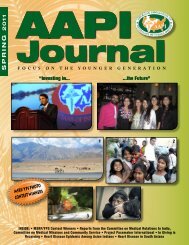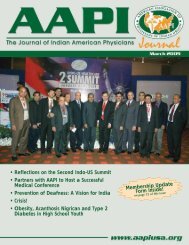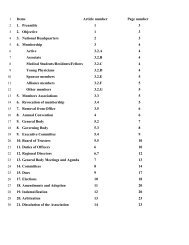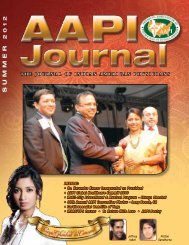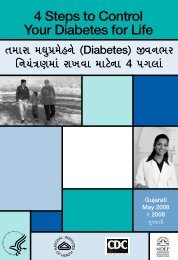functional medicine and nutritional genomics - American Association ...
functional medicine and nutritional genomics - American Association ...
functional medicine and nutritional genomics - American Association ...
You also want an ePaper? Increase the reach of your titles
YUMPU automatically turns print PDFs into web optimized ePapers that Google loves.
AAPI’S NUTRITION GUIDE TO OPTIMAL HEALTH: USING PRINCIPLES OF FUNCTIONAL MEDICINE AND NUTRITIONAL GENOMICS<br />
vii Gearhardt AN, Corbin WR, Brownell KD. Food<br />
addiction an examination of the diagnostic criteria for<br />
dependence. J Addict Med. 2009;3:1-6.<br />
viii Olds J, Milner P. Positive reinforcement produced<br />
by electrical stimulation of septal area <strong>and</strong> other<br />
regions of rat brain. J Comp Physiol Psychol.<br />
1954;47:419–427.<br />
ix Positive Psychology: Harnessing the power of<br />
happiness, personal strength, <strong>and</strong> mindfulness.<br />
Harvard Health Publications. 2009:4-6.<br />
x Wang GJ, Volkow ND, Thanos PK, Fowler JS.<br />
Similarity between obesity <strong>and</strong> drug addiction as<br />
assessed by neuro<strong>functional</strong> imaging: a concept<br />
review. J Addict Dis. 2004;23:39-53.<br />
xi Salamone JD, Cousins MS, Snyder BJ. Behavioral<br />
functions of nucleus accumbens dopamine: empirical<br />
<strong>and</strong> conceptual problems with the anhedonia<br />
hypothesis. Neuroscience Biobehav Rev.<br />
1997;21:341-145.<br />
xii Meguid MM, Fetissov SO, Varma M, et al.<br />
Hypothalamic dopamine <strong>and</strong> serotonin in the<br />
regulation of food intake. Nutrition. 2000;16:843-<br />
857.<br />
xiii Stice E, Spoor S, Bohon C, Veldhuizen M, Small<br />
D. Relation of reward from food intake <strong>and</strong><br />
anticipated food intake to obesity: a <strong>functional</strong><br />
magnetic resonance imaging study. J Abnorm<br />
Psychol. 2008;117:924-935.<br />
xiv Wang GJ, Volkow ND, Logan J, et al. Brain<br />
dopamine <strong>and</strong> obesity. Lancet 2001;357:354-357.<br />
xv Colantuoni C, Schwenker J, McCarthy J, et al.<br />
Excessive sugar intake alters binding to dopamine<br />
<strong>and</strong> mu-opioid receptors in the brain. NeuroReport.<br />
2001;12:3549-3552.<br />
xvi McEntee W & Crook T. Glutamate: its role in<br />
learning, memory, <strong>and</strong> the aging brain.<br />
Psychopharmacology 1993;111:391–401.<br />
xvii Kalivas P, McFarl<strong>and</strong> K, Bowers S, Szumlinski K,<br />
Xi Z, Baker D. Glutamate transmission <strong>and</strong> addiction<br />
to cocaine. Ann NY Acad Sci. 2003;1003:169-<br />
175.<br />
xviii Blum K, Braverman ER, Holder JM, et al.<br />
Reward deficiency syndrome: a biogenetic model for<br />
the diagnosis <strong>and</strong> treatment of impulsive, addictive,<br />
<strong>and</strong> compulsive behaviors. J Psych Drugs.<br />
2000;32(suppl i-iv)1-112.<br />
xix Killgore WD, Young AD, Fernia LA, Bogorodzki P,<br />
Rogowska J, Yurgelun-Todd DA. Cortical <strong>and</strong> limbic<br />
activation during viewing of high- versus low-calorie<br />
foods. Neuroimage. 2003;19:1381-1394.<br />
64<br />
xx Bassareo V, Di Chiara G. Modulation of feedinginduced<br />
activation of mesolimbic dopamine<br />
transmission by appetitive stimuli <strong>and</strong> its relation to<br />
motivational state. Eur J Neurosci. 1999;11:4389-<br />
4397.<br />
xxi Avena NM, Rada P, Hoebel BG. Sugar <strong>and</strong> fat<br />
bingeing have notable differences in addictive-like<br />
behavior. J Nutr. 2009;139:623-628.<br />
xxii Martindale D. Burgers on the brain. New<br />
Scientist. 2003;177.<br />
xxiii Havel P. Peripheral signals conveying metabolic<br />
information to the brain: short-term <strong>and</strong> long-term<br />
regulation of food intake <strong>and</strong> energy homeostasis.<br />
Exp Biol Med. 2001;226:963-977.<br />
xxiv MacPherson K. Sugar can be addictive, Princeton<br />
scientist says. http://<br />
www.Princeton.edu/main/news/archive/S22/88/56G<br />
31/index.xml?section=topstories. December 10,<br />
2008. Accessed 6/1/10.<br />
xxv Bart Hoebel, RhD. ‚sugar can be addictive,<br />
Prinsceton scientist says.‛<br />
http:www/Princeton.edu/main/news/archive/S22/88/<br />
56G31/index.xml?section=topstories. Accessed<br />
6/1/10.<br />
xxvi Avena NM, Rada P, Hoebel BG. Evidence for<br />
sugar addiction: behavioral <strong>and</strong> neurochemical effects<br />
of intermittent, excessive sugar intake. Neurosci<br />
Biobehav Rev. 2008;32:20-39.<br />
xxvii Lenoir M, Serre F, Cantin L, Ahmed SH. Intense<br />
sweetness surpasses cocaine reward. PloS one.<br />
2007;2(8):e698.<br />
xxviii Food <strong>and</strong> Agricultural Organization. Global <strong>and</strong><br />
Regional Food Consumption Patterns <strong>and</strong> Trends.<br />
http://www.fao.org/docrep/005/AC911E/ac911e05.<br />
htm. Accessed 4/8/09.<br />
xxix Gaysinskaya VA, Karatayev O, Change GQ,<br />
Leibowitz SF. Increased caloric intake after a highfat<br />
preload: relation to circulating triglycerides <strong>and</strong><br />
orexigenic peptides. Physiol Behav. 2007;91:142-<br />
153.<br />
xxx<br />
Chang GQ, Gaysinskaya V, Karatayev O,<br />
Leibowitz SF. Maternal high-fat diet <strong>and</strong> fetal<br />
programming: increased proliferation of hypothalamic<br />
peptide-producing neurons that increase risk for<br />
overeating <strong>and</strong> obesity. J Neuroscience.<br />
2008;28:12107-12119.<br />
xxxi Adam TC, Epel ES. Stress, eating <strong>and</strong> the<br />
reward system. Physiol Behav 2007;91:449-458.<br />
2012




